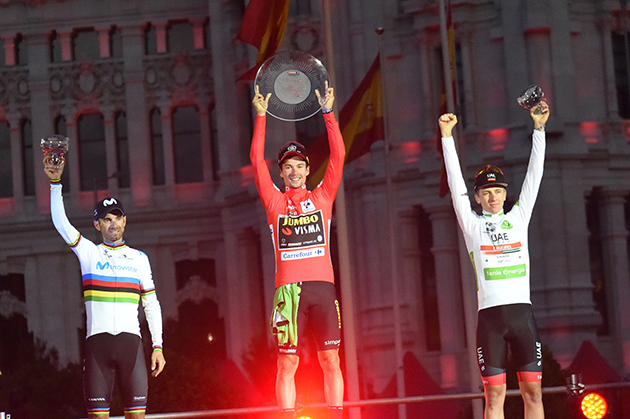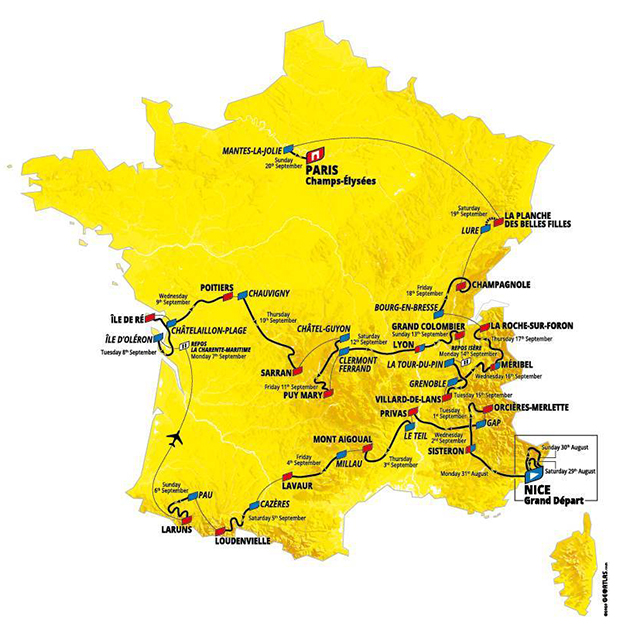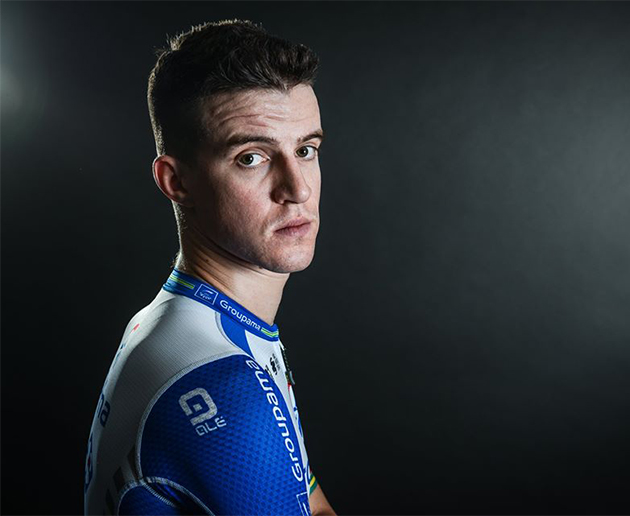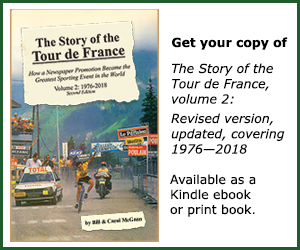Bicycle Racing News and Opinion,
Thursday, April 30, 2020
Back to news and opinion index page for links to archived stories | Commentary | Our YouTube page
2019 Tour de France | 2019 Giro d'Italia
That men do not learn very much from the lessons of history is the most important of all the lessons of history. - Aldous Huxley

Current racing:
- April 28-May 3:
Tour de Romandie
Upcoming racing:
- April 30-May 3:
Tour de Yorkshire - May 1:
Rund um den Finanzplatz Eschborn-Frankfurt - May 1-3:
Vuelta Asturias
Latest completed racing:
- April 22-26: Digital Swiss 5
- April 24-26:
Vuelta a Castilla y Leon - April 26:
Liège-Bastogne-Liège - April 26:
Giro dell'Appennino - April 20-24:
Tour of the Alps - April 22:
La Flèche Wallone
La Vuelta 20 will consist of 18 stages and will take off from the Basque Country, not the Netherlands
Here's an update for the Vuelta's organizers:
The La Vuelta organisation, in accordance with the UCI (International Cycling Union), agreed to delay the race’s 75th edition. La Vuelta 20 was originally going to take place from the 14th of August to the 6th of September, departing from the Netherlands. However, the necessary reorganization of the annual cycling calendar, due to the global health crisis caused by COVID-19, has forced these plans to change. In the end, La Vuelta 20 – whose new dates haven’t been determinate by the UCI yet - will consist of 18 stages and will take off from the Basque Country.

With the ways things are headed, we really can't know when the Vuelta will be run. Sirotti photo
Following the official cancelation of La Vuelta 20’s official departure from The Netherlands, Unipublic, as the race organizer, has decided not to replace the three first stages – which were going to travel through the Dutch regions of Utrecht and North Brabant – and instead begin the Spanish tour with the Irun – Arrate. Eibar stage. This is what has been communicated to the UCI in the aim that the cycling regulatory body could be able to reorganize the calendar with a Vuelta consisting of 20 days, instead of the original 23.
This decision has been motivated by the exceptional situation brought about by the health crisis currently affecting every industry, including sports. “Obviously, when you design the race, you hope to never have to make changes of this magnitude, but we have to be sensible with the current situation and we have to accept that it is very difficult to replace an official departure at this late stage, given all the institutional and logistic planning that it involves”, stated Javier Guillén, Director of La Vuelta.
An historical edition
With its new configuration, La Vuelta’s 75th edition will be a historical race in many aspects. It will be the first time in the past 35 years that it consists of fewer than 21 stages. The last time this happened was in 1985, with an edition featuring 19 stages. It will also be the first time since Unipublic took over control of the race in 1979 that La Vuelta will take off from the Basque Country. It has been almost five decades since Euskadi last hosted the race’s official departure. In 1961, La Vuelta took off from San Sebastián, with a team time trial featuring both the starting-line and finish-line in the city.
“To have that passion for cycling that is so present in the Basque Country from the very first day makes this change in plans much more pleasant”, added Guillén. “In any case, we only hope that this unprecedented health crisis is resolved soon, that we can all return to normal, including La Vuelta – that will again consist of its traditional format and duration of 21 stages and two rest days in 2021”, he concluded.
Tour de France may have to limit spectator numbers to comply with coronavirus regulations
Eurosport posted this Tour update:
The Tour de France may have to limit spectators during the first days of the race in order to comply with a ban on major events gathering more than 5,000 people before September, the French sports ministry said.
Prime Minister Edouard Philippe said on Tuesday that major sporting and cultural events bringing together more than 5,000 participants could not be held before September as he announced plans for a gradual end of a nationwide coronavirus lockdown from May 11.

The current Tour de France route and schedule: Aug 29 - September 20. We'll see.
Philippe did not specifically mention the Tour de France, which has been postponed to Aug. 29-Sept. 20 from its original June 27 start date.
"It is too early to say (how this will impact the Tour) but for now this does not imply a postponement nor a cancellation, but it does not rule out arrangements notably in terms of number of spectators," a sports ministry spokeswoman said.
You can read the entire article here.
An extended interview with Groupama-FDJ rider Miles Scotson
The team posted this:
Miles Scotson may have escaped quarantine on the UAE Tour, he could not avoid the confinement that has spread over Europe in recent weeks. After a solid start to his second season with the Groupama-FDJ cycling team, the 2017 Australian champion is now, like his colleagues, stuck at home, looking forward to getting back to his pro cyclist routine. In the meantime, he sat down for a good half-hour to grant us a long interview.

Miles Scotsun
Miles, can you first tell us how you’ve experienced the past few weeks?
I’ve been in Andorra since mid-March and the lockdown rules are similar here to those in France, Spain, Italy… Basically, I’ve just been training indoors, doing my best to respect the quarantine and keeping myself productive. For an athlete, it can be boring because we’re used to always exercising outdoors, travelling. We’re probably never at our homes for this long. I just try to stay productive and it’s going by pretty quick. I think before we know it we’ll be back to our normal routines if everything goes well.
How do you stay productive?
Actually, we are now allowed to go out for a walk. They just relaxed the rules a little bit and I think it’s really important for the mind. My coach on the team has included some outdoor runs and hikes, and I think that’s been good for mental health. The team is really good at understanding this aspect; it’s not all about the training in this stage, it’s about staying positive and looking after your mind because it is a different situation to be in isolation for so long. Apart from this, I’m studying some more French. I’ve started some lessons, which the team arranged. That’s kind of keeping me productive off the bike, and then, I’m just staying in touch with friends and family.
Have you actually considered going back to Australia?
When this all started, it was probably more uncertain than now, I wasn’t sure of the full extent of this situation. My parents are a bit old so I was worried if the situation got really bad in Australia, if they got sick… But there was a decision to make and I decided to stay over here. It was probably not the safest thing to do to get on a plane, to go to the airport when this situation was happening. However, I obviously keep in contact with my family and friends back home.
How is training indoors for you?
It’s not something I ever really enjoyed. I think all riders are a little bit different. Some guys really like to just look at the numbers on the computer and put in the effort. For me, I don’t really see it as massive training for the races that are coming, but just as a way to stay fit, healthy, and I think it’s mentally good to do some exercise. The team has been really good, my coach Anthony Bouillod sent me a program with an hour session a day and some activities. I get it done and it’s good as it can be.
How was the team’s support over the last weeks?
I have definitely been very happy with the support of the team. I’ve been able to speak with riders from other teams regarding the situation and this is obviously a stressful time for cycling. That’s why I personally feel very lucky to be on this team where we have the management, sponsors, and partners standing behind as now. But not only that, the communication has been really good between my coach, my reference sports director Jussi Veikkanen, who I keep in touch with. Now, everybody is just waiting to see how this pans out, but in terms of regular communication, I can’t really ask for more really.
Overall, how do you feel you’ve adjusted to the team since you joined it?
From a riding and racing perspective, I think I’ve been able to fit in fairly well. Plenty of races in the first year went really smoothly. To come to a French team, when you don’t live in France and don’t speak the language, was a big step for me, but I felt comfortable from the beginning because the team is supportive. I keep working on my French and the language will make it hopefully better for me and for everyone else in the future. But even as a foreigner on this team, there is a feeling of a bit of a family. It’s quite a united team. I came from a team that was more of a collection of riders rather than a real group. So even as a foreigner, I do feel I’m a part of the team, so it’s been nice.
Was the language barrier a real issue?
I think I’ve been fairly fortunate that I’m normally racing in a group where the majority of the guys speak some English. For the race plans and everything, you eventually have more and more of an understanding of what’s happening. In the beginning it was pretty unknown but I think I was fortunate that I always had people to translate or just help me understand after a meeting. I think it’s gone pretty smoothly so far. It was a big step, especially that I spoke no French when I joined the team, but I think the team is becoming more and more international as well. Guys like Jacopo, Ramon, Ignatas are usually the riders translating to me but also giving me a kick up the ass to improve my French as well so they don’t have to keep translating. In this period, I’m trying to improve my French, but not even for the racing. The more you can communicate well with your teammates and staff, the nicer it’s going to be. Once I can speak more French, I’ll be able to know better a lot of the French guys who don’t speak English. When there is a language barrier, it’s hard to get to know someone so this is surely motivation to keep trying for me.
Despite the language barrier, you decided to join the team. Why so?
My first contact with the team was through Frederic Grappe, I believe. He simply and clearly explained to me what they’re doing on the team, what they’re trying to improve in, how the team works on the sports side with the directors and the medical. It was a very good explanation. After these first calls, I thought ‘’this could be a nice option for the future’’. The team was very enthusiastic. It was certainly a big step to go to a French team, but just their infrastructure and their way of working felt like what I needed. The year before I was missing some direction in my career and I just decided to take the spot that Groupama-FDJ offered to me.
Last year you had to adjust to a French team, but can you tell us how it is for a young Australian to adjust to a new Continent?
During my years in U23, I spent a lot of time in Italy, but with the U23 Australian group. I probably spent six months or more living there. Then, when I turned professional with BMC, I moved to Belgium and lived alone there. That did not work for me. The first year adjusting to Europe is definitely not easy. I saw other U23 Australian guys packing up and going back to Australia even though we were all hoping to go professional. It’s tough to live on the other side of the world and not speak the language. When you turn professional, it is also a way longer time away; you leave your friends and family. It definitely was a tough time in my neo-professional years but eventually I moved to Spain. I felt a bit more at home there than I did in Belgium, probably partly for the weather. Now I’m in Andorra, I really like it here. I have some Australian riders living up here; I’ve shared an apartment with my brother for a year now. For now, I only know a small bit of Spanish. I had a Spanish girlfriend for a while and that still did not improve my Spanish too much because I was trying to learn French so I did not want to be confused. It would also be nice to learn Spanish because it would make the living over in Europe better as well, but for some reason, I seem to get away speaking English most of the time. Anyway, I pretty much got used to the lifestyle but you definitely give up a lot. I see my friends and family in Australia just over Christmas, for one month, and then I’m back to Europe. Eventually you get used to it but it’s a big jump. It almost feels strange now when I get back to Australia. It’s home but it’s weird when you hear the Australian accent again, and it’s just a different way of living there.
What kept you going in the early tough years?
Talking to people at that time, I figured that the first years are definitely the hardest when you move to Europe. I think they are the hardest for any neo professional actually, because it’s a big adjustment going from a U23 into the professional ranks, but it makes it even harder when you’re living alone in another country. I think you just need to stay positive when you get through that period and you’ll come out of it stronger. I personally got to a point where I did question at times “Is this the career path I want to take? To do this, to live in Europe?” Cycling as we face it now is not the most secure work. We’re always looking for another contract; there is a lot of uncertainty in our sport, crashes, injuries. I loved racing my bike as an under 23 and my dream was always to get to the top level and go professional. That’s what kept me going and now that we’re stuck in quarantine, I’m missing the lifestyle of a professional cyclist, which a couple years ago I was questioning.
How would you assess your first season with the team?
It was probably the most consistent season that I had. In my first two years as a neo-pro I had some really good results but I also had some terrible races and I lacked the race days. Last year, the team and the directors put together a really nice race program for me with much more race days than I had in my first two years, including a Grand Tour. I was really thankful for that. Going into last year, my priority was to fit in with the team’s racing, working in whatever role I was given by the directors to do the best that I could. I didn’t really have big objectives for personal results last year, I was more looking for this consistency and a good feeling with the team in a working role. I stopped my season at the end of August, a little early, for a surgery also planned by the team. On the racing side, it went really smoothly, and I was super pleased with it. I was pretty happy with the season and I was hoping for it to set me up for this year. I was more looking for results if the opportunity arose this season, but obviously the situation is different now.
You actually started this season in a good way…
It was probably a better start to the season than I expected. I had a knee reconstruction at the beginning of September and in mid-October I was going through a rehab to get the pedal stroke back. I wasn’t actually back on the road until the very end of November. I just kind of had December and the beginning of January to slowly build up. I think my good start to the season was not from the short training that I had. It was from the good race program last year with the Grand Tour. The good consistent season I had set me up, so when I started the year, even if I had gone months without racing, I felt pretty good in my first race. Unfortunately, I got ill after the first stage of the UAE Tour but I still felt I made another jump. It was a really strong start to the season.
We also saw you working in the lead-out trains…
Last year, I had a slightly different role for Arnaud, more riding at the front earlier in stages. There were just a couple of times I had to ride the final. I know his final two guys are Jacopo Guarnieri and Ramon Sinkeldam and they need that extra guy in front of them for the last kilometre. At the Tour Down Under, I was doing some good work alongside Jacopo for Marc Sarreau. It was actually the work I was doing there that made them realize it could work really well in the train for Arnaud. At UAE, I was able to work in the train with Kono before me and Ramon, Jacopo and Arnaud after. In the first stage, we did not get a top result but the lead-out was super good, really enjoyable, united and strong. There was a really good feeling that day. If we get back to racing at the end of this season, I’m looking forward to a role like that again. I think all of us in Arnaud’s group are looking forward to it because for the first race of the season, it was perfect.
Do you still carry personal ambitions?
On a flat stage, when you have a rider like Arnaud Démare or Marc Sarreau, I have no personal ambition, nor do I on a hard mountain stage. In those cases, I just want to give my best to whoever is the best shot for the team. With my team pursuit and time trialling background, I think I can do this and give good support. Normally when I go to a race, it’s my first priority. But of course, if I’m in top shape and confident, I’m a guy that will back myself for raising my arms. Normally, that would have to be for a time trial or an opportunistic stage, for a breakaway or with a final where you can attack. But as I say, if it’s not suited for me and I have a teammate that needs our help, I just want to give 100% to him.
At 26, you know what kind of rider you are?
I see myself as an all-rounder. I think I can work in sprint trains, I can also offer support for making the pace on a medium climbing stage. If I am in shape, I can go for a time trial, a prologue or an opportunity as well. I wouldn’t work specifically for something because it’s nice if I can always have an objective. I don’t want to just be waiting for the time trial, or just looking for the sprint stage. I’d rather have a role everyday. I think for any difficult stage races with time trials, you normally have to be a GC rider and I don’t see that in my capabilities. But something like the Tour du Poitou-Charente is a perfect race for me to try to target the win one day. I was fourth there last year thanks to the time trial, and I had some support just to try to keep my position and win the youth classification. It’s a great team for giving opportunities. If they see that you have the form, they’re going to give you the support to go for a result. In the next years, I’d like to target an Australian title again. I’ve won the U23 titles and I’ve won the Elite Race. If I have the opportunity to keep racing professionally in Europe, I’d love to wear the Australian champion colours again. That would probably be one of my biggest goals going forward. Apart from that, there is not too much personal ambition, just helping the big leaders of our team.
What do you expect from the 2020 strange season if it resumes?
I think it’s probably going to be the craziest, most unpredictable racing when I think about it. You’re going to have many riders very nervous, very uncertain. Many of us, including myself, are racing for another contract and then there are guys whose team’s future is uncertain as well. If we get back, it’s going to be interesting, very fast, furious racing with very short recovery between the races, so it’s going to be super hard racing at the end of the season. It would also be unpredictable because we need to see how everyone gets out of the situation. Some people are training outdoors, some people are training indoors, and everyone probably has a different level of motivation right now. There is still a plan for three Grand Tours, so I’d personally hope to ride the Giro or the Vuelta if they go ahead. It would be nice to work with the sprint lead-out train again, do some one-day races, target time trials. If we get back, there would be plenty to focus on riding for the team and for sure plenty of motivation after a long time off.
Back to news and opinion index page for links to archived stories | Commentary









